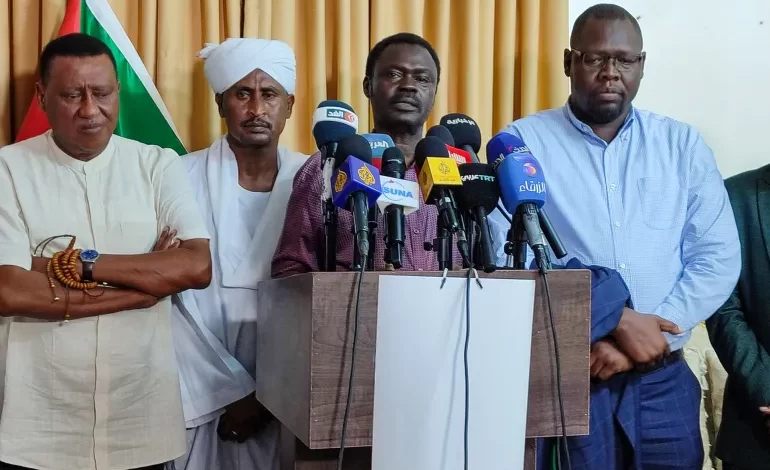What Do Minni Minawi’s Hints About Possible Contact with the RSF Mean?

Sudan Events – Agencies
Statements by Darfur Regional Governor Minni Arko Minawi, in which he hinted at the possibility of engaging with the Rapid Support Forces (RSF), have raised political and public questions.
At the conclusion of a meeting of the political committee of the Democratic Bloc, Minawi said: “We will continue engaging with the international community, political forces, and even the RSF if we find they have a reasonable vision.”
This stance has prompted analysts and observers to explore its background and implications. Al Jazeera Net spoke with several political analysts to get their perspectives on Minawi’s new remarks.
A Conditional Invitation
Minawi has held the position of governor of Darfur—comprising five states—since 2021 after the signing of the Juba Peace Agreement. He is also the leader of the Sudan Liberation Army movement, which is currently fighting alongside the Sudanese Armed Forces (SAF), and he heads the political committee of the Democratic Bloc.
Political analyst Ahmed Musa Omar believes Minawi’s comments align with the government’s approach of keeping channels for peace open—on the condition that the RSF commits to the outcomes of the Jeddah Agreement, signed on May 20, 2023, by Saudi Arabia, the United States, Sudan’s government, the SAF, and the RSF.
In statements to Al Jazeera Net, Omar noted that Minawi’s remarks reflect the political perspective of the Democratic Bloc rather than a personal or collective vision of his movement—and certainly not a state position.
He emphasized that any dialogue with the RSF would not be binding on the Sudanese government. “Even if it happens before official negotiations, it would be preparatory in nature—built on a reasonable vision, with the Democratic Bloc possibly acting as a mediator between the army and the RSF. In that sense, it’s a procedural dialogue more than one aiming for solutions.”
Omar explained that this proposed dialogue is contingent upon the RSF presenting a “reasonable vision” to end the war—essentially a conditional invitation awaiting the RSF’s initiative. If accepted, it could open the door to a political settlement.
He added that Minawi tied the seriousness of the dialogue to discussions around the war, where the final word lies with the SAF—placing the Democratic Bloc in the role of a mediator.
According to Omar, the Democratic Bloc is committed to de-escalation and opening humanitarian corridors in Darfur. Achieving this involves making a “conditional invitation” to the RSF to submit a viable vision for presentation to official entities. He also noted the matter is not without regional and international calculations.
International Actors
The city of El Fasher holds immense strategic importance for the SAF. It is the army’s last stronghold in Darfur, home to joint forces command, and the frontline in the defense of El-Obeid. Its fall would mean RSF control over all of Darfur’s states.
Political analyst Hassan Shayeb, Director of the Capital Center for Political and Strategic Studies, sees Minawi’s statement as lacking in objectivity and procedural legitimacy. He criticized Minawi for not presenting the idea to the Sovereignty Council or the Cabinet, despite being part of the ruling structure.
Speaking to Al Jazeera Net, Shayeb questioned why Minawi took the matter to the public instead of formal government institutions.
He described the comments as “politically immature” and asserted that any genuine political settlement must come from a centralized decision-making body. “Minawi cannot achieve that on his own.”
Shayeb further argued that any settlement that does not lead to the RSF’s removal from the political and military scene cannot be called a real solution. “What the RSF has done leaves no path for reconciliation or reintegration into Sudan’s political landscape.”
He suggested that international pressure might be behind such rhetoric, referencing the cancellation of a meeting by the Quartet (likely involving international mediators).
He also pointed out the strong influence of international and regional actors in Sudan and noted that axis-based rivalries may be exerting pressure through both incentives and coercion. Shayeb emphasized that the military and humanitarian situation in Darfur requires a clear vision—either military or political—for breaking the siege on El Fasher.
Flexibility or Lack of Influence?
Political analyst Walid Al-Noor described Minawi as “the most controversial political figure,” known for making contradictory statements.
He argued that Minawi’s latest remarks, like his previous ones, will not impact the political process or lead to any real progress. “Political settlements require genuine will, not political posturing.”
Al-Noor does not believe the war’s trajectory will be affected by such statements, asserting that it will only change through natural developments, real political will, and international pressure.
On the other hand, Louay Abdelrahman, editor-in-chief of Qalb Africa news site, sees Minawi’s statements as a sign of political flexibility not common among Sudanese politicians, who often cling rigidly to their positions.
He said Minawi’s remarks signal that he is open-minded—that taking up arms was a means to a better future for Darfur and Sudan, not an end in itself.
Abdelrahman ruled out that these statements indicate a change in Minawi’s previous stances, calling them a positive gesture toward peace—a green light for the Sudanese government to proceed with negotiations with the RSF militia.
In an exclusive statement to Al Jazeera Net, he said such a move might ease the discomfort of others who hesitate to support calls for peace and dialogue among Sudanese factions.
He concluded that Minawi’s statements reflect genuine intent toward peace and an effort to reshape his image, marred by associations with the former regime and its aftermath.
Though unlikely to impact battlefield realities, Abdelrahman suggested the remarks could push the government toward negotiations and help de-escalate tensions in Darfur—potentially leading to a comprehensive peace.
Source: Al Jazeera



